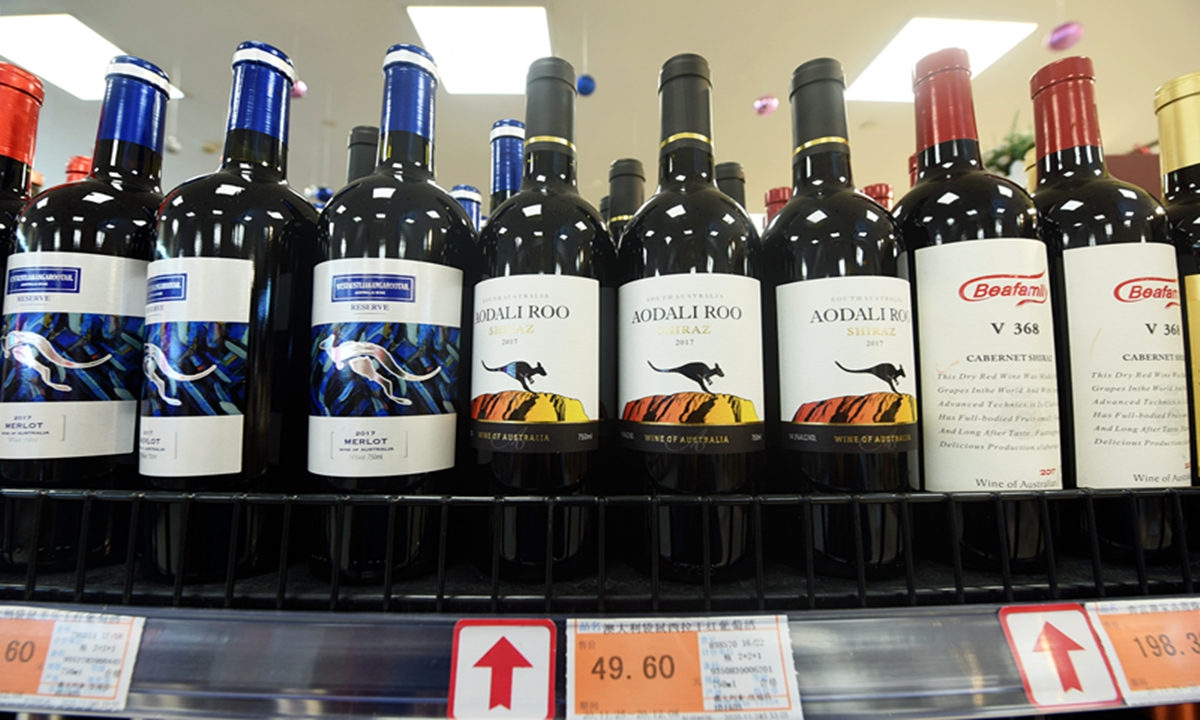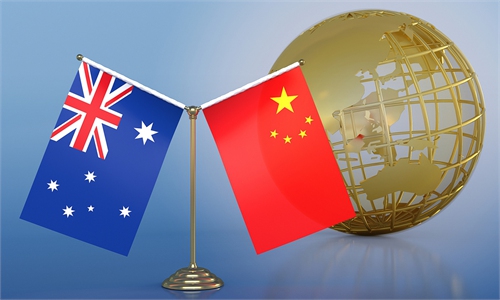Chinese traders, experts hail Australian trade minister's visit, warn against anti-China politics

Bottles of Australian wine on the shelf of a supermarket in Hangzhou, East China's Zhejiang Province on November 27, 2020 Photo: VCG
Australia's Trade Minister Don Farrell is on a high-stakes trip to China to improve trade ties with his country's biggest trading partner after years of tension. Chinese traders and experts hailed the move as being a crucial positive step toward improved cooperation, but they also called on Canberra to stop "anti-China moves" to avoid a political impact on trade.
Diplomatic interactions between senior Chinese and Australian officials have been increasing in recent months, following a meeting between the leaders of the two countries in November. Farrell's visit to China from Thursday to Saturday is the first trip for an Australian trade minister to China in four years.
Among other items on the agenda, Farrell was scheduled to co-chair the Joint Ministerial Economic Commission with Chinese Commerce Minister Wang Wentao. This would be the first time since the commission was last convened in Beijing in 2017, underscoring the significance of the trip. While there have been no official statements about the talks as of press time on Friday, the trip has boosted expectations among Chinese and Australian businesses.
As bilateral tensions have been thawing, many Chinese wine importers have been preparing for the resumption of import activities since the beginning of this year, with many paying visits to Australian wineries, according to Chen Wei, an importer of Australian wine.
"As for expectations going forward, I hope the resumption comes as soon as possible and Australian wine can return to the Chinese market before the end of the year," Chen told the Global Times. "I also hope that China-Australia bilateral relations will be able to return to the previous 'honeymoon' period."
In 2020, the Chinese Ministry of Commerce (MOFCOM) started an anti-dumping investigation into wine imports from Australia following a request from a Chinese industry association. As a result of the probe, in November 2020, importers of Australian wine were required to pay deposits ranging from 107.1 percent to 212.1 percent. MOFCOM stated that the decisions were made in line with Chinese laws and WTO rules.
The MOFCOM announced in March, 2021 that it would impose anti-dumping duties from 116.2 percent to 218.4 percent on imported Australian wine. The ruling, which took effect on March 28, 2021 will last five years.
The duties as well as Chinese consumers' resentment toward the previous Australian government's hostile words and deeds against China led to a plunge in Australian wine exports to China.
But the current Australian government has been actively seeking to improve ties, particularly trade cooperation, with China, and many are hoping for recovery of the wine trade between China and Australia.
In an exclusive interview with the Global Times, Chinese Ambassador to Australia Xiao Qian said that since the Australian Labor Party took office, with the joint efforts of both sides, there have been frequent high-level interactions and close practical cooperation in various fields between the two countries. "At present, China-Australia economic and trade relations are facing an important window period," Xiao said.
In addition to the wine business, Chinese tourists have also shown growing interest in visiting Australia, with many hoping for the inclusion of Australia in the list of countries to which China has resumed group tours.
"Though Australia is not in the list of countries for group tour resumption, the number of people making inquiries or applying for visas is increasing," Jia Jianqiang, CEO of 6renyou, an online tourism agency in Beijing, told the Global Times. "We have also been trying to spark interest among clients and are actively making business preparations so we can start Australia-bound tourism."
However, despite the growing expectations for improved trade cooperation, businesses and experts also cautioned against a potential political impact on bilateral ties.
"I also hope Australia will not make anti-China moves politically, so as to avoid a political impact on economic policies," said Chen Wei, the wine trader.
Chen Hong, president of the Chinese Association of Australian Studies and director of the Australian Studies Centre at East China Normal University, said that Farrell's visit to China is a constructive step that can promote the improvement of bilateral relations. Compared with the past, there have been growing ministerial-level talks and people-to-people interactions, which is a welcome sign.
"However, if Australia uses its anti-China position as means to strengthen its strategic importance, in order to cater to the strategic needs of the US, or if it challenges or provokes China's core interests, China will not tolerate it," Chen Hong told the Global Times.

